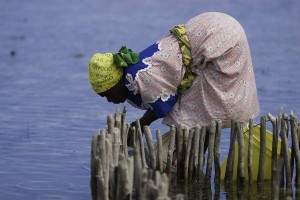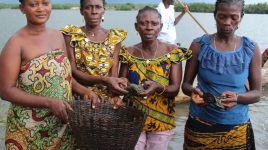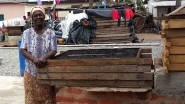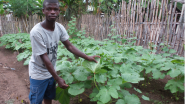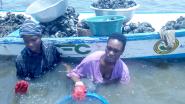Women Shellfishers and Food Security Project Year 1 Annual Report
Women Shellfishers and Food Security Project 15 October 2021
In September 2020, The United States Agency for International Development (USAID) awarded the University of Rhode Island (URI) the Women Shellfishers and Food Security Activity (project). With USAID, URI co-created the project in partnership with the University of Cape Coast (UCC) in Ghana, the University of Ghana (UG), TRY Oyster Women’s Association in The Gambia, and World Agroforestry (ICRAF) based in Nairobi, Kenya.
This project addresses the need for greater attention to food security for women shellfishers and their families while improving biodiversity conservation of the ecosystems on which their livelihoods depend. More robust models, tools, approaches, and processes are needed to enable and promote these sustainable food systems and natural resource management in coastal West Africa. The project will strengthen the evidence base, increase awareness, and equip stakeholders to adapt and apply successful approaches in areas of high potential for replication and scale-up in the eleven coastal West African countries from Senegal to Nigeria. It will draw on successful cases of a rights-based, ecosystem-based, participatory co-management approach to shellfish management by women in mangrove ecosystems in The Gambia and Ghana developed with USAID assistance. Knowledge and experience generated through the project will open up opportunities for improvement and broader application of these promising approaches in West Africa. This report documents progress on project implementation at the end of Year 1, September 15, 2020 – September 14, 2021, of this two-year project.
The Women Shellfishers and Food Security Project: Multivariate Analysis of the Theory of Change Model
Crawford, B., Adu-Afarwuah, S., Oaks, B., Kyei-Arthur, F., Chuku, E. O., Okyere, I., Duguma, L., Carsan, S., McMullin, S., Muthee, K., Bah, A., Orero, L., Janha, F., Arnold, C. D., Kent, K. 28 September 2022
This report is a summary of a multivariate analysis of the theory of change model of the USAID Women Shellfishers and Food Security Project, funded by The United States Agency for International Development (USAID) and implemented by the University of Rhode Island (URI) and several partners from West Africa – the University of Cape Coast (UCC) in Ghana, the University of Ghana (UG), TRY Oyster Women’s Association (TRY) in The Gambia and, World Agroforestry (ICRAF). This project seeks to address the need for greater attention to food security for women shellfishers and their families while improving biodiversity conservation of the mangrove and estuarine ecosystems on which their livelihoods depend.
The theory of change model put forth by this project was:
IF women’s shellfish livelihoods in coastal mangrove and estuarine ecosystems in The Gambia and Ghana are improved through gender and nutrition sensitive co-management and linkages made to community based forest management in the land/seascape, THEN mangrove and estuarine biodiversity will be improved, AND IF approaches for sustainable food producing livelihoods within the coastal mangrove land/seascape contribute to a nutritionally balanced local food supply, THEN household resilience, sustainable food systems, and nutrition will improve.
We refined this model and developed four major hypotheses statements to be assessed through site-based research. These were:
Hypothesis 1. Improved and gender equitable management of shellfisheries increases shellfish yields, which increases shellfish consumption and income of those engaged in shellfishing.
Hypothesis 2. Shellfisher mangrove management actions improve mangrove habitat which in turn improves the health of shellfish stocks.
Hypothesis 3. High consumption of shellfish and increased income from shellfishing contributes to lower prevalence of anemia in women of reproductive age and improves other nutrition variables. Shellfish consumption is a main contributor to reduced anemia compared to other factors such as geographic factors or household and individual characteristics.
Hypothesis 4. Enriching landscapes around mangrove-shellfish estuaries systems with complementary food and nutrition sources reduces the extractive pressure on the mangroves thereby improving mangrove health and improves shellfisher household income and household food security.
Avaliação Participativa das Marisqueiras nos Ecossistemas Estuarinos e de Mangais da Guiné.Bissau
Mancali, N., Adotey, J., Chuku, E. O., Josephs, L., Kent, K., Crawford, B. 4 August 2021
This report details results from a participatory assessment of the scale and scope of shellfisheries and shellfish-based livelihoods as they relate to mangrove systems and coastal water bodies in Guinea-Bissau. This includes demographic and socioeconomic information on shellfish harvesters and other shellfish value chain actors, the nature of shellfishery engagement of these individuals, the status of shellfisheries and mangrove systems, and any existing governance and management regimes. Stakeholders made a number of recommendations for improving the shellfisheries. Portuguese version.
Spotlighting Women-Led Fisheries Livelihoods Toward Sustainable Coastal Governance: The Estuarine and Mangrove Ecosystem Shellfisheries of West Africa
Chuku EO, Effah E, Adotey J, Abrokwah S, Adade R, Okyere I, Aheto DW, Kent K, Osei IK, Omogbemi ED, Adité A, Ahoedo K,Sankoh SK, Soro Y, Wélé M, Saine DF, Crawford B 18 July 2022
The governance of coastal and marine resources remains a complex socio-ecological endeavor in many African countries, but women are leading the way and demonstrating a pathway for food fish security through rights-based co-management of shellfisheries in estuarine and mangrove ecosystems in West Africa. We report comprehensively, for the first time, the scale of estuarine and mangrove ecosystem-based shellfisheries across the West African coast (Senegal, Gambia, Guinea Bissau, Guinea, Sierra Leone, Liberia, Côte d’Ivoire, Ghana, Togo, Benin, and Nigeria), the gender dynamics, and implications for the sustainable management of this small-scale fishery. We find an extensive geographical coverage of active shellfisheries within these ecosystems with close to 571,000 household beneficiaries and over 50,000 harvesters, mainly women, being the primary resource users. An annual shellfish harvest of over 300,000 MT valued at USD 336 million is potentially undocumented across the region. Harvested shellfish species of economic importance comprised 18 species of mollusks, 11 species of crustaceans,and a few unidentified groups of gastropods, crustaceans, and cephalopods. The West African mangrove oyster, periwinkle, bloody cockle, whelk, and razor clam were, in that order, the most harvested estuarine shellfish. The bivalve and gastropod value chains are dominated by women harvesters at all nodes whereas women play significant roles in the processing and marketing of crustacean and cephalopod fisheries. Formal laws specific to the regulation of estuarine shellfisheries are generally nonexistent, however, the organized women shellfish harvester groups of the Tanbi wetlands (The Gambia) and Densu Delta (Ghana) have championed sustainable governance actions resulting in successful women resource user-led fisheries co-management. The elements of success and opportunities for scaling up these examples are discussed. The presence of such groups in several locations offers an entry point for replicating a similar co-management approach across the West African coast. This is an open source article published in the journal Frontiers of Marine Science 9:884715. doi: 10.3389/fmars.2022.884715
Évaluation Participative Des Pêcheries De Mollusques Et Crustacés Dans Les Écosystèmes D’estuaires Et De Mangroves Du Nigéria
Omogbemi, E. D., Chuku, E. O. Adotey, J., Josephs, L., Kent, K. Crawford, B. 10 July 2021
This report details results from a participatory assessment of the scale and scope of shellfisheries and shellfish-based livelihoods as they relate to mangrove systems and coastal water bodies in Nigeria. This includes demographic and socioeconomic information on shellfish harvesters and other shellfish value chain actors, the nature of shellfishery engagement of these individuals, the status of shellfisheries and mangrove systems, and any existing governance and management regimes. Stakeholders made a number of recommendations for improving the shellfisheries. French version.
